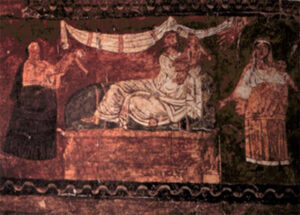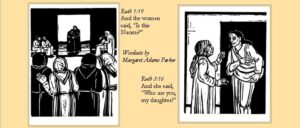 Ruach HaYam teaching presented by a fabulous guest teacher, Liam Hooper, author of “Trans-Forming Proclamation: A Transgender Theology of Daring Existence”!! April 22, 2021.
Ruach HaYam teaching presented by a fabulous guest teacher, Liam Hooper, author of “Trans-Forming Proclamation: A Transgender Theology of Daring Existence”!! April 22, 2021.
Reading I Kings 17 (especially, vs 2-16) as literature moves us beyond the surface narrative and overt prophecies to reveal the messages below the narrative that are conveyed in the allegory.
Delving into the elements of the story allows us to apprehend some implications of the values and priorities held by the god-character.
In his book, “Trans-Forming Proclamation: A Transgender Theology of Daring Existence”, Liam Hooper develops the following conclusions: “For God, no element of creation – be it seasonal wadi, grain for bread, or plot of ground to grow it – is expendable. No member of creation is too small, too weak, too unlikely, or too strange to participate in the good of God’s cosmic household. Moreover, no single person is expendable.”
From here, Liam proposes that there are profound social justice messages in the tale of Elijah, the widow of Zarephath, her son, the ravens, and the wadi.
Join us for a discussion of the implications found in this god-character’s interventions with the outcasts beyond the gates of the city.
Liam’s book is not required reading, but it is highly recommended. For this class, Chapter 8 is of particular interest. You can look for the book on Amazon or through your local independent bookstore.
Image: Elijah Restores the Widow’s child. Third century C.E. Detail of a wall painting from the Dura Europos synagogue (Syria). https://www.bibleodyssey.org/…/e/elijah-dura-europos
Paintings from the synagogue in Dura Europos, a city on the Euphrates River in Syria, represent the earliest continuous narrative cycle of biblical images ever discovered. The synagogue was built between 244 and 245 C.E. and destroyed in 256 C.E. when the Sassanids (Neo-Persians) sacked the city. French–American excavations of the site in the 1920s marked a new beginning in the study of Jewish art. The continuous action of the painting, looking from left to right, shows the widow, dressed in mourning black, giving Elijah her dead son. In the center, Elijah revives the boy, with God’s outstretched hand appearing in the upper right. On the right, the widow appears again in colorful garments, holding her living son.
At 6:45pm ET, meeting will be open for logging in, schmoozing and solving any technical issues. [see below for details]
Study begins at 7:15 ET.
——>>>>>> Zoom login can be found in the Ruach HaYam study room
https://www.studywithpenina.com/ruach_hayam
——>>>>>> Only recognized names will be admitted to Zoom meeting. Please be sure to RSVP
Penina Weinberg is an independent Hebrew bible scholar whose study and teaching focus on the intersection of power, politics and gender in the Hebrew Bible. She has run workshops for Nehirim and Keshet and has been teaching Hebrew bible for 10 years. She has written in Tikkun and HBI blog, and is the leader and founder of Ruach HaYam.
*** Ruach HaYam https://www.facebook.com/groups/Ruach.HaYam/ study sessions provide a queer Jewish look at text, and are welcoming to LGBTQ+ and allies, to any learning or faith background, to all bodies, and friendly to beginners***


